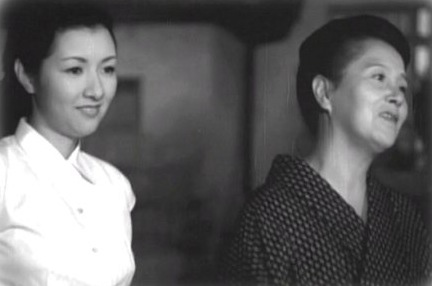成瀬巳喜男 1952 93分
出演:高峰秀子、浦辺粂子、香川京子など
3度目の再見。陰惨とした住環境、肉親間のしがらみの中に捕らわれている主人公の鬱憤が、ふつふつと煮えたぎってゆき、中盤のある一点において解放されるという構造は「乱れる」に似ている。違うのは、前者が一人の女性の精神的独立を描き、後者は禁じられた恋の成就を描いているということもできるかもしれぬが、そんなことよりも、しがらみで腐りきった実家から抜け出し、世田谷で独立した高峰秀子が偶然出逢い、憧憬を覚える隣の兄妹の理想化された関係がどう見ても気持ち悪く、互いを見つめ合いながら微笑み合う兄妹が、ステレオタイプを超越し不気味さすら湛えているのがおもしろい。その理想化された隣の家から聞こえてくるピアノの音で、泣き荒んでいた高峰秀子が元気を取り戻し、笑顔で母親といっしょに路地を歩くという奔放な展開は、映画はシンプルでいいのだという好例といえる。
Lightening Naruse Mikio 93 minutes
Seen this film twice before. First time on DVD. The temporal structure in which the main character gets suppressed under family politics and poverty in the 1st half then gets released free in the 2nd half, is very similar to “Yearning”. You could say the difference is that the former portrays woman’s independence and the latter unravels the forbidden love affair. But more importantly, I’d love to stress the weird purity of Mineko Takamine’s neighbors. They are a brother and a sister who happen to live next to Takamine’s cheap apartment. She gives envious gaze at this “idealized” siblings, when they joke and smile to each other. What we see is more creepy abnormality and weirdness of the couple rather than the lovable, idealistic family relations — this was pretty interesting to me. At the end the deeply-wounded family ties between Takamine and her mother surprisingly feel optimistic when she hears the sound of the neighbor playing the piano — this is a wonderful example how simple cinema can be.
稲妻 Lightening

